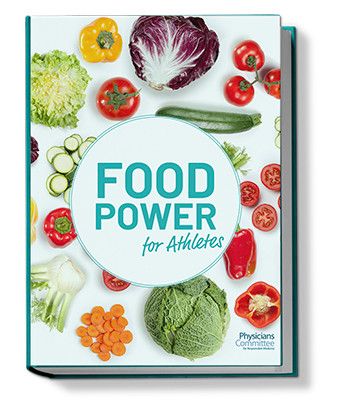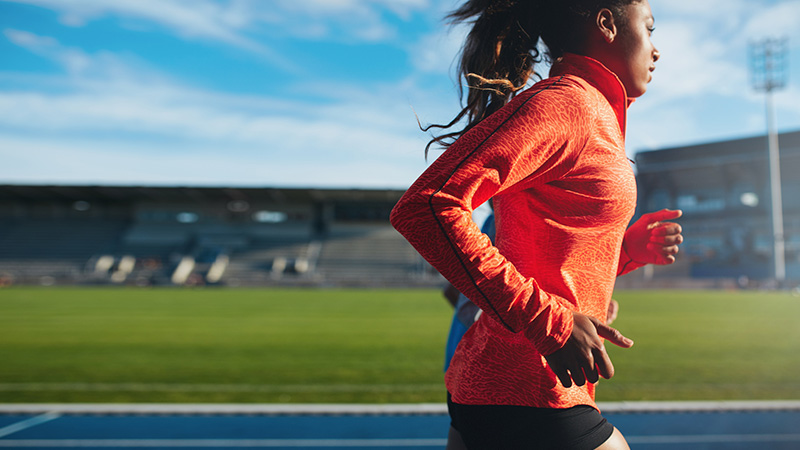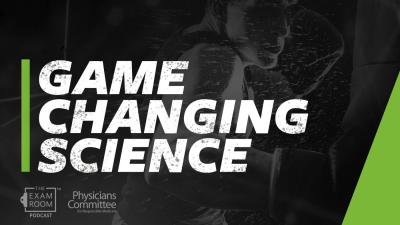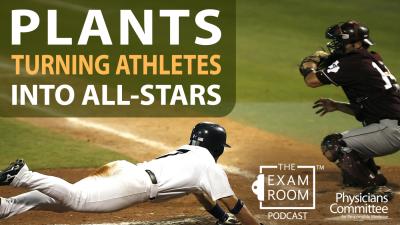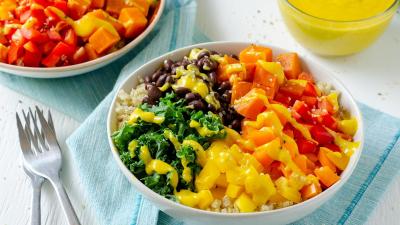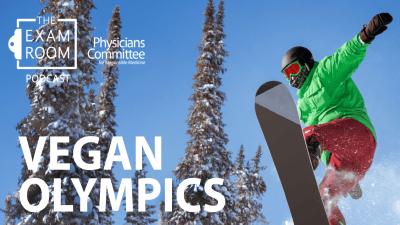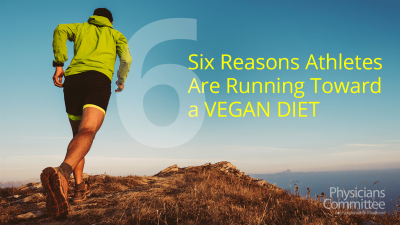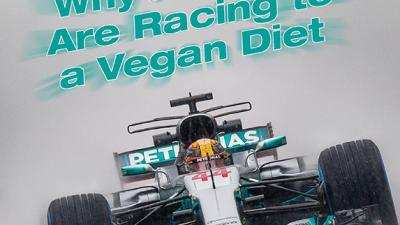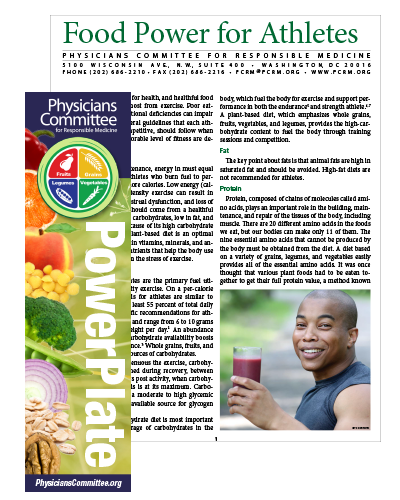Vegan Nutrition for Athletes
A Plant-Based Diet Is an Optimal Sports Diet
Many athletes have reached the top of their athletic careers while following a plant-based diet. A plant-based diet provides all of the nutrients your body needs for training and competition, including sufficient carbohydrates to fuel workouts, sufficient protein to build muscle, and sufficient micronutrients to support recovery.
Because a plant-based diet is high in carbohydrates, low in fat, and rich in vitamins, minerals, and antioxidants, it can support or improve your athletic performance. A Physicians Committee study found that plant-based athletes benefit from improvements in heart health, performance, and recovery.1
The Benefits of a Plant-Based Diet for Athletes
- Leaner body mass: Research has found that vegan diets are associated with a lower body mass compared to vegetarian or omnivorous diets.2 This can be largely explained by replacing energy-dense animal-based foods with lower-calorie-dense plant-based foods that generally have a higher water content, lower fat content, and higher fiber content. Plant-based foods also result in an increase in the thermic effect of food, meaning we expend more calories digesting plant-based foods than animal-based foods.3 A leaner body mass is frequently desired, particularly in endurance sports, as reduced body fat is associated with increased aerobic capacity, and consequently improved endurance.4
- Improved recovery: Exercise (and other diet and lifestyle habits) produces free radicals, which can damage our cells when the production of these free radicals exceeds the body’s ability to neutralize them. Plant-based whole foods are high in antioxidants, which neutralize these free radicals.1 Short-term inflammation after exercise is a normal response and helps the body to heal after a short bout of exercise. However chronic inflammation may reduce recovery.5 Plant-based diets have also been consistently shown to reduce markers of inflammation in the blood.6
- Improved health: Plant-based diets are protective against many of the diseases we see today. See our other health pages for further information.
Carbohydrates
Carbohydrates are the primary fuel used during high-intensity exercise. Carbohydrates are also essential for replenishing glycogen stores in the muscles and liver after exercising. The current recommendation from the American College of Sports Medicine is for athletes to consume 5–10 grams of carbohydrates per kilogram bodyweight per day, depending on the exercise intensity and duration.7 While complex carbohydrates from whole foods are optimal for health, simple, high-glycemic-index carbohydrates can support athletic performance and glucose delivery during exercise.8
Protein
Compared with carbohydrates, protein is used only minimally for fuel. Its primary function is building and maintaining body tissue, especially muscle. The recommended dietary allowance for the average, sedentary or lightly active adult is 0.8 grams per kilogram of body weight per day. For most people, this is more than enough.
For athletes, the protein guidelines are:
- 1.2-1.4 grams/kilogram/day for endurance athletes.
- 1.6-1.8 grams/kilogram/day for strength and power athletes.
- 2+ grams/kilogram/day for bodybuilders in short-term cutting phases.
These are the guidelines from the International Society of Sports Nutrition position statement.9 However, it is important to know that the goals of elite athletes consuming more than 2 grams of protein per kilograms per day are focused on performance and not necessarily optimizing their longevity or overall health. Eating such high amounts of protein each day may crowd out calories from other beneficial foods, such as whole grains, fruits, vegetables, and other foods, which promote optimal health and longevity. Therefore, it is important to understand your short- and long-term goals when determining how much protein to consume.
Athletes looking for additional protein can get an extra boost from beans, soy milk, nuts, seeds, and soy products, including tofu, tempeh, and veggie burgers.
Multiple clinical trials have demonstrated that when matched for protein and training, plant proteins are just as effective at building muscle as animal proteins. One trial compared 19 habitual vegans and 19 habitual omnivores.10 Both groups consumed 1.6 grams protein per kilogram bodyweight per day, supplemented with soy or whey protein and participated in a resistance training program for 12 weeks. Both groups increased their amounts of lean muscle mass and improved their 1 repetition max attempts, with no statistically significant differences between groups.
Another clinical trial also compared an exclusively vegan diet to an omnivorous diet, matched for protein at 2 grams/kilogram/day, in a 10-week resistance training program, and similarly found that there were no significant differences between the increase in muscle size or strength.11 This clinical trial also found that three days of each diet yielded similar muscle protein synthesis rates, which is the rate at which we are able to build new muscle tissue after exercise.
For those athletes who wish to supplement with a protein powder could consider using a soy protein powder, which has been found to be as effective as animal protein at improving strength and muscle size, according to a meta-analysis published in 2018.12 Soy contains phytoestrogens (or plant estrogens), which has mistakenly been said to have a feminizing effect on men. However, two meta-analyses have found that neither soy nor isoflavones (a type of phytoestrogen) have a negative effect on testosterone levels.13-14
Fat
Fat is a necessary part of the diet, as it plays a role in the absorption of fat-soluble vitamins, is an alternative energy source, and is used in the production of hormones. The general recommendation for fat intake for athletes is 20-35% of daily calories, according to various position papers published by sports associations.15-16 It is also recommended in those position statements that saturated fat intake be kept to below 10% of daily calories. Low-fat diets providing around 10% of daily calories from fat, though beneficial for certain diseases such as type 2 diabetes, are not well studied in athletes. High-fat diets are not recommended for athletes due to their limitation of important nutrients, especially carbohydrates and fiber. Plant-based omega-3 fats found in nuts are anti-inflammatory and may promote recovery in athletes.17-18 Athletes could also consider an algae-based omega-3 supplement.
Plant-Powered Prescription
- Get most of your calories from carbohydrates, such as whole grains, fruits, and vegetables.
- Determine your protein intake by your activity level and goals.
- Include tofu and tempeh in your diet, as these are high-protein foods that can help you meet your protein requirements.
- Include at least 2 tablespoons of a plant-based source of omega-3 (ground flaxseed, chia seeds, or walnuts).
- Eat at least 2 cups of fruit and at least 3 cups of vegetables each day, which are high in micronutrients that may promote recovery.
Food Power for Athletes
Download our free e-book to learn how plant-based foods can fuel athletic performance and to get started with plant-powered recipes! Fill out the form below and the download link will be delivered to your email inbox.
A Vegan Diet Benefits Athletes
A Physicians Committee review shows plant-based athletes benefit from improvements in heart health, performance, and recovery.
[After I went vegan,] I started repairing and recovering at this rate that blew me away, which was huge because I could handle more load, I could handle more out on the track, I could handle more in the weight room, which made us a better team.
Dotsie Bausch, 2012 Olympic silver medalist
Learn more from Dotsie in this plant-powered athlete e-book.Further Reading
References
- Barnard ND, Goldman DM, Loomis JF, et al. Plant-based diets for cardiovascular safety and performance in endurance sports. Nutrients. 2019;11(1):130. doi:10.3390/nu11010130
- Tonstad S, Butler T, Yan R, Fraser GE. Type of vegetarian diet, body weight, and prevalence of type 2 diabetes. Diabetes Care. 2009;32(5):791-796. doi:10.2337/dc08-1886
- Kahleova H, Petersen KF, Shulman GI, et al. Effect of a low-fat vegan diet on body weight, insulin sensitivity, postprandial metabolism, and intramyocellular and hepatocellular lipid levels in overweight adults: a randomized clinical trial. JAMA Netw Open. 2020;3(11):e2025454. doi:10.1001/jamanetworkopen.2020.25454
- Mondal H, Mishra SP. Effect of BMI, body fat percentage and fat free mass on maximal oxygen consumption in healthy young adults. J Clin Diagn Res. 2017;11(6):CC17-CC20. doi:10.7860/JCDR/2017/25465
- Howard EE, Pasiakos SM, Blesso CN, Fussell MA, Rodriguez NR. Divergent roles of inflammation in skeletal muscle recovery from injury. Front Physiol. 2020;11:87. doi:10.3389/fphys.2020.00087
- Menzel J, Jabakhanji A, Biemann R, Mai K, Abraham K, Weikert C. Systematic review and meta-analysis of the associations of vegan and vegetarian diets with inflammatory biomarkers. Sci Rep. 2020;10(1):21736. doi:10.1038/s41598-020-78426-8
- Thomas DT, Erdman KA, Burke LM. Position of the Academy of Nutrition and Dietetics, Dietitians of Canada, and the American College of Sports Medicine: nutrition and athletic performance. J Acad Nutr Diet. 2016;116(3):501-528. doi:10.1016/j.jand.2015.12.006
- Williams C, Rollo I. Carbohydrate nutrition and team sport performance. Sports Med. 2015;45 Suppl 1(Suppl 1):S13-S22. doi:10.1007/s40279-015-0399-3
- Jäger R, Kerksick CM, Campbell BI, et al. International Society of Sports Nutrition position stand: protein and exercise. J Int Soc Sports Nutr. 2017;14:20. doi:10.1186/s12970-017-0177-8
- Hevia-Larraín V, Gualano B, Longobardi I, et al. High-protein plant-based diet versus a protein-matched omnivorous diet to support resistance training adaptations: a comparison between habitual vegans and omnivores. Sports Med. 2021;51(6):1317-1330. doi:10.1007/s40279-021-01434-9
- Monteyne AJ, Coelho MOC, Murton AJ, et al. Vegan and omnivorous high protein diets support comparable daily myofibrillar protein synthesis rates and skeletal muscle hypertrophy in young adults. J Nutr. 2023;153(6):1680-1695. doi:10.1016/j.tjnut.2023.02.023
- Messina M, Lynch H, Dickinson JM, Reed KE. No difference between the effects of supplementing with soy protein versus animal protein on gains in muscle mass and strength in response to resistance exercise. Int J Sport Nutr Exerc Metab. 2018;28(6):674-685. doi:10.1123/ijsnem.2018-0071
- Reed KE, Camargo J, Hamilton-Reeves J, Kurzer M, Messina M. Neither soy nor isoflavone intake affects male reproductive hormones: an expanded and updated meta-analysis of clinical studies. Reprod Toxicol. 2021;100:60-67. doi:10.1016/j.reprotox.2020.12.019
- Hamilton-Reeves JM, Vazquez G, Duval SJ, Phipps WR, Kurzer MS, Messina MJ. Clinical studies show no effects of soy protein or isoflavones on reproductive hormones in men: results of a meta-analysis. Fertil Steril. 2010;94(3):997-1007. doi:10.1016/j.fertnstert.2009.04.038
- Thomas DT, Erdman KA, Burke LM. American College of Sports Medicine joint position statement. Nutrition and Athletic Performance. Med Sci Sports Exerc. 2016;48(3):543-568. doi:10.1249/MSS.0000000000000852
- Aragon AA, Schoenfeld BJ, Wildman R, et al. International society of sports nutrition position stand: diets and body composition. J Int Soc Sports Nutr. 2017;14:16. doi:10.1186/s12970-017-0174-y
- Nieman D, Arnett L, Arnold M, Blevins T, Casebolt S, Williams J. Influence of almond supplementation on recovery responses to unaccustomed exercise in untrained adults. Curr Dev Nutr. 2022;6(Suppl 1):1167. doi:10.1093/cdn/nzac073.005
- Philpott J, Kern M, Hooshmand S, et al. Pistachios as a recovery food following downhill running exercise in recreational team-sport individuals. Eur J Sport Sci. 2023;23(12):2400-2410. doi:10.1080/17461391.2023.2239192
